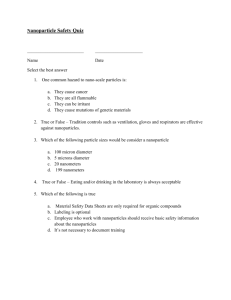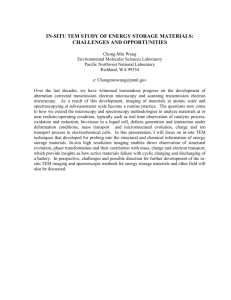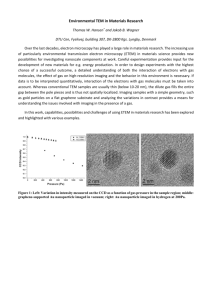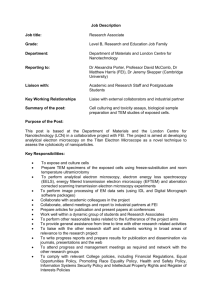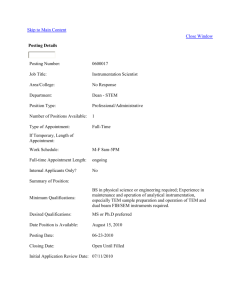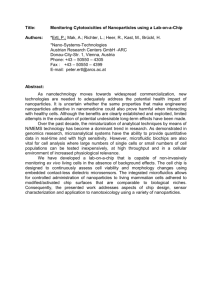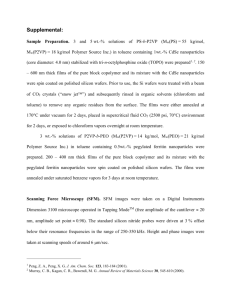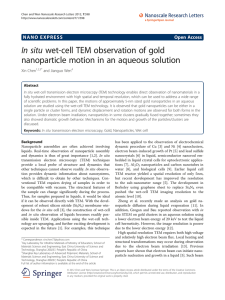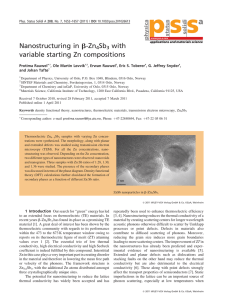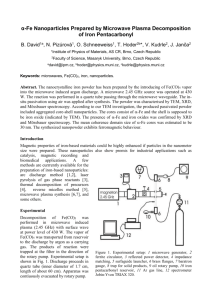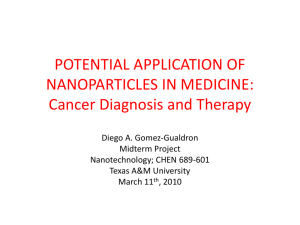Purpose of the Post
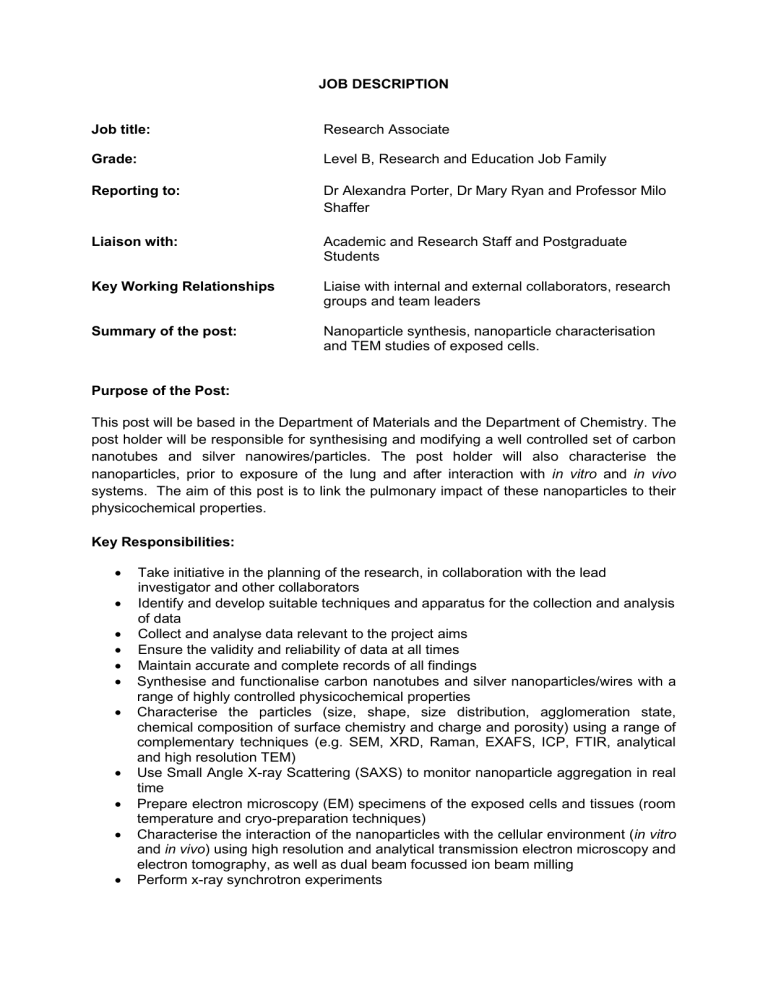
Job title:
Grade:
Reporting to:
JOB DESCRIPTION
Research Associate
Level B, Research and Education Job Family
Dr Alexandra Porter, Dr Mary Ryan and Professor Milo
Shaffer
Liaison with:
Key Working Relationships
Summary of the post:
Purpose of the Post:
Academic and Research Staff and Postgraduate
Students
Liaise with internal and external collaborators, research groups and team leaders
Nanoparticle synthesis, nanoparticle characterisation and TEM studies of exposed cells.
This post will be based in the Department of Materials and the Department of Chemistry. The post holder will be responsible for synthesising and modifying a well controlled set of carbon nanotubes and silver nanowires/particles. The post holder will also characterise the nanoparticles, prior to exposure of the lung and after interaction with in vitro and in vivo systems. The aim of this post is to link the pulmonary impact of these nanoparticles to their physicochemical properties.
Key Responsibilities:
Take initiative in the planning of the research, in collaboration with the lead investigator and other collaborators
Identify and develop suitable techniques and apparatus for the collection and analysis of data
Collect and analyse data relevant to the project aims
Ensure the validity and reliability of data at all times
Maintain accurate and complete records of all findings
Synthesise and functionalise carbon nanotubes and silver nanoparticles/wires with a range of highly controlled physicochemical properties
Characterise the particles (size, shape, size distribution, agglomeration state, chemical composition of surface chemistry and charge and porosity) using a range of complementary techniques (e.g. SEM, XRD, Raman, EXAFS, ICP, FTIR, analytical and high resolution TEM)
Use Small Angle X-ray Scattering (SAXS) to monitor nanoparticle aggregation in real time
Prepare electron microscopy (EM) specimens of the exposed cells and tissues (room temperature and cryo-preparation techniques)
Characterise the interaction of the nanoparticles with the cellular environment ( in vitro and in vivo ) using high resolution and analytical transmission electron microscopy and electron tomography, as well as dual beam focussed ion beam milling
Perform x-ray synchrotron experiments
Present experimental findings to the immediate research group and Head of
Laboratory on a regular basis
Collaborate with academic colleagues in the project
Write articles for publication and present papers/posters at national and international conferences as directed by the Head of Laboratory
Contribute positively to a dynamic group of students and other Research Associates
Provide general assistance from time to time with other research related activities
Write progress reports and prepare results for publication and dissemination via journals, presentations and the web
Oversee, supervise and train, in association with the Head of Laboratory, undergraduate and postgraduate students
Travel, as required, for meetings with (potential) collaborators and to attend conferences and project progress meetings
To comply with relevant College policies, including Financial Regulations, Equal
Opportunities Policy, Promoting Race Equality Policy, Health and Safety Policy,
Information Systems Security Policy and Intellectual Property Rights and Register of
Interests Policies
Teaching:
Teach and advise students within own subject area
Undertake instruction of PhD and BSc students as required
Supervise practical work and advise students on techniques
Laboratory and Administrative Duties:
Assist with the management of the laboratory
Participate in maintaining a safe, clean and healthy laboratory working environment
Read, understand and regularly update self and members of the laboratory on health and safety regulations (e.g. COSHH)
Participate in ordering laboratory items (equipment and consumables)
Maintain accurate records of experiments
Other Duties:
Perform any other duties commensurate with the grade of the post as directed by the investigator(s)
The successful candidate will also comply with all relevant College policies, including Data
Protection, Financial Regulations, Equal Opportunities Policy, Promoting Race Equality
Policy, Health and Safety Policy, Information Systems Security Policy and Intellectual
Property Rights and Register of Interests Policies.
Job descriptions cannot be exhaustive and so the post holder may be required to undertake other duties, which are broadly in line with the above key responsibilities.
Imperial College is committed to equality of opportunity and to eliminating discrimination. All employees are expected to adhere to the principles set out in our Equal Opportunities in
Employment Policy, Promoting Race Equality Policy and Disability Policy and all other relevant guidance / practise frameworks.
Personal Specification
Applicants are required to demonstrate that they possess the following attributes:
Education and Qualifications:
A PhD (or equivalent) in Chemistry or the Physical Sciences
Knowledge and Experience:
Nanoparticles synthesis and modification research experience
Research experience in characterisation of nanoparticle-cell interfaces
Experience with a range of nanoparticle characterisation techniques
Expertise in analytical and high resolution transmission electron microscopy
Knowledge of health and safety regulations relevant to work within a laboratory e.g.
COSHH
General knowledge of Research Governance
Desirable:
Experience with focussed ion beam scanning electron microscopy is desirable
Skills and Abilities:
To synthesis and modify nanoparticles
To characterise nanoparticles(e.g. SEM, XRD, Raman, EXAFS, ICP, FTIR, analytical and high resolution TEM)
To perform preparation of cells and tissues for TEM analysis, i.e. fixing, staining and relevant data analyses
To perform analytical and high resolution TEM analyses
To learn and develop existing laboratory techniques
To use appropriate statistical techniques
To keep accurate records
To make effective use of scientific literature to direct research
To teach and supervise in your area of research
Effective interpersonal and organisational skills
To work as part of a team
To assess resource requirements and deploy them effectively
To encourage a research culture in others
To exercise initiative
To work independently
To relate appropriately to others
To write clearly and concisely to a level consistent with publication in highly regarded international journals
To write research related documentation and papers
Good presentation skills
Desirable:
To use Microsoft Office presentation packages e.g. PowerPoint and Photoshop
